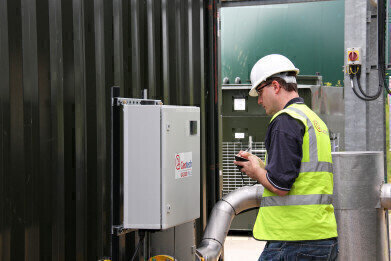Gas Detection
Easy Payback for Biogas Monitoring
Jul 23 2013
There is a strong business case for biogas monitoring and CHP protection. A fixed biogas analyser may cost some £6-10,000 and monitor gas every few minutes day and night. By comparison it can save its own cost many times over by protecting CHP engines from expensive unplanned downtime, biogas engine damage repair and help maximise ROI. On a small 0.5MW plant, at around four percent of the CHP cost, an analyser may take five days to pay for itself in avoiding lost downtime. On a £10 million site it could pay for itself in half-a-day’s downtime.
For those who own, fund, build or operate a £1m-£20m AD plant with CHP engines costing £250-750,000 each, this asks a tough question: Why risk such an enormous investment and not have an effective fixed biogas analyser keeping watch, protecting the investment and maximising returns? It seems that there is an acceptance that this damage is unavoidable and therefore businesses are budgeting for and paying out thousands of pounds every year.
Biogas is dirty, wet, explosive, hot, smelly and gives CHP engines a hard time, and with varying feedstocks there can be problems with increasing levels of hydrogen sulphide (H2S) and siloxanes. Both can cause rapid engine wear and damage requiring processes to minimise them but also frequent oil changes and servicing. CHP engine H2S level limits may be set in manufacturers’ warranty contracts at 400, 900 or 1500ppm of H2S over a specified number of hours. More than that and the warranty may be invalidated and/or the CHP’s sensors may simply shut it down.
Revenue stops when the engine stops. That means analysing biogas before it reaches a CHP not only makes business sense, it also shows if the operation to remove or neutralise H2S is working. H2S levels going to CHPs are controllable but first operators need to measure, analyse and assess what they need to control. Oxygen content is also a potential problem. A landfill ingress leak of oxygen can cause a burst cylinder head valve which can cost at least £10,000. Clearly limiting damage makes good business sense.
To simultaneously measure high level H2S at 0-10,000ppm before H2S removal and at 0-50ppm after H2S removal, the inclusion of two separate H2S cells in its new GA3000 PLUS is a recent innovation by Geotech (UK) on a user-installed, multi-sample point fixed biogas analyser. For some £6,000-£10,000 it can protect a £1m-£20m plant and engine, and therefore be paid for within half a day of avoided unplanned downtime. It is an ROI many businesses crave.
There are several inconvenient facts. For start-up, spark-ignition CHP gas engines need at least 40% methane with 60% as a good operating level. Low grade biogas with less than 40% methane may need to be flared. So it is essential to monitor and analyse biogas for safe, damage-free engine start-up and running, and to supply to correct quality gas to CHP or to flare if poor quality. Flaring AD gas is necessary in some circumstances, but could be like throwing money away. To avoid producing low quality biogas requires vigilance which is easily achieved with a fixed gas analyser. Reliability, dependability and operator confidence in gas analysers is critically important. Geotech measures its performance and reports over 99% uptime on its installed GA3000 and GA3000 PLUS fixed biogas analysers.
Estimates of CHP running costs vary. One set of annual operation cost for a 1MW engine, including downtime costs, was stated as £70,000/year. That ties in with a CHP overhaul being done every two years (replace pistons, etc.) for which, the £35,000 cost includes £9,000 of lost revenue due to planned downtime (96 hours). That relates to a revenue or cost of downtime at £2,250 a day. In addition, every 1,000 hours at a cost of £1,200 every time, the CHP must be stopped for an oil and filter change, and to clean and gap spark plugs, and set the tappets. Fixed, automated biogas analysers can help make cost limitation and control much more manageable and achievable. Their cost is a very small fraction of the large sums they can help save which is why there is an easy pay back from biogas monitoring.
More at www.geotechuk.com.
Digital Edition
IET 34.2 March 2024
April 2024
Gas Detection - Biogas batch fermentation system for laboratory use with automatic gas analysis in real time Water/Wastewater - Upcycling sensors for sustainable nature management - Prist...
View all digital editions
Events
May 06 2024 Minneapolis, MN, USA
May 13 2024 Munich, Germany
May 15 2024 Lund, Sweden
May 15 2024 Frankurt-am-Main, Germany
May 20 2024 Columbus, OH, USA


















